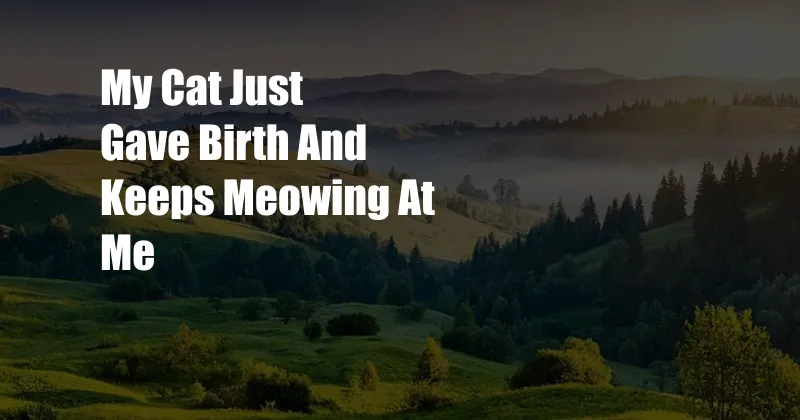
My Feline Companion’s Urgent Pleas: Understanding My Cat’s Persistent Meows Post-Birth
The arrival of a new litter of kittens is an undeniably joyous occasion for both cat owners and the feline mother. However, it’s not uncommon for the birthing process to leave the mother cat feeling exhausted and vulnerable. One of the ways she may express this vulnerability is through persistent meowing, which can leave concerned pet owners wondering why their furry friend is exhibiting this behavior.
In this comprehensive guide, we’ll delve into the various reasons why your cat may be meowing excessively after giving birth. We’ll explore her physical and emotional needs, discuss the latest trends in feline postpartum care, and provide expert advice to help you soothe your cat and ensure her well-being.
Post-Birth Instincts: The Protective Mother’s Call
Immediately following childbirth, cats experience a surge of protective instincts towards their newborn kittens. This instinct drives them to keep their young close and safe, often vocalizing to communicate their location and well-being. Meowing is one of the primary ways cats express this urge to protect their litter.
Additionally, cats may meow to alert you to any potential threats or disturbances near their nesting area. Their heightened sensitivity during this postpartum period makes them more vigilant and responsive to their surroundings, leading to increased vocalizations.
Medical Considerations: Ensuring Maternal Health
While excessive meowing is often associated with a cat’s protective instincts, it’s essential to rule out any underlying medical conditions that may be causing discomfort or pain. If your cat’s meowing is accompanied by additional symptoms such as lethargy, loss of appetite, or discharge from the reproductive tract, it’s crucial to seek professional veterinary attention promptly.
Certain medical conditions, such as uterine infections or retained placentas, can lead to significant discomfort and require immediate treatment to prevent further complications. Consulting with a veterinarian will ensure that your cat receives appropriate medical care and helps alleviate any underlying health issues that may be contributing to her vocalizations.
Nutritional Needs: Nourishment for the Nursing Feline
The demands of nursing can significantly deplete a cat’s energy reserves. To replenish these essential nutrients and support milk production, cats require a high-quality diet during the postpartum period. Increasing the frequency and portion size of her meals can help ensure that she has adequate nourishment.
It’s important to offer your cat a diet rich in protein, especially animal-based proteins, as these are crucial for milk production. Providing access to a consistent source of fresh water is equally important to prevent dehydration and support her overall health.
Comfort and Bonding: A Nurturing Environment for Mother and Kittens
Creating a calm and comfortable nesting area is essential for both the mother cat and her kittens. Choose a secluded location in your home, away from potential disturbances. Provide a warm, cozy bed or blankets for her to rest and shelter her litter.
Interaction with you, her human companion, can provide additional comfort and support. Gentle petting, soothing words, and a quiet presence can help her feel reassured and reduce her anxiety. Respect her need for space, but let her know that you’re nearby and available to assist her in any way she needs.
Expert Advice for Postpartum Cat Care
In addition to the tips mentioned above, here are some additional recommendations from experienced veterinarians and cat behaviorists:
- Monitor your cat’s behavior and seek veterinary attention if her meowing persists excessively or is accompanied by other concerning symptoms.
- Provide a consistent diet of high-quality cat food, increasing the frequency and portion size during the postpartum period.
- Create a calm and comfortable nesting environment with access to fresh water, warm bedding, and a safe hiding place.
- Spend time with your cat, offering gentle affection and reassurance, but respect her need for space and privacy.
By following these recommendations, you can help your cat feel comfortable, secure, and supported during this critical postpartum period, ensuring a healthy and harmonious environment for both her and her newborn kittens.
Frequently Asked Questions about Postpartum Cat Meowing
Q: Why is my cat meowing excessively after giving birth?
A: Meowing after childbirth is typically driven by protective instincts, ensuring the safety of her litter. It can also indicate medical issues, nutritional needs, or a desire for comfort and reassurance.
Q: How can I tell if my cat’s meowing is due to a medical problem?
A: If your cat’s meowing is accompanied by other symptoms, such as lethargy, loss of appetite, or discharge, seek veterinary attention promptly to rule out any underlying medical conditions.
Q: What is the best way to provide comfort and support to my postpartum cat?
A: Create a calm nesting area, offer a high-quality diet, provide gentle affection and reassurance, and respect her need for space and privacy.
Q: Is it normal for my cat to meow intermittently throughout the postpartum period?
A: Yes, occasional meowing is expected as your cat adjusts to motherhood and her protective instincts towards her kittens.
Q: Should I be concerned if my cat’s meowing suddenly changes in pitch or volume?
A: Yes, any significant changes in your cat’s vocalizations could indicate a change in her well-being or medical condition. Consult with your veterinarian to rule out any potential issues.
Conclusion: Understanding and Responding to Your Cat’s Postpartum Meows
Understanding the reasons behind your cat’s persistent meowing after giving birth is crucial for ensuring her well-being and maintaining a harmonious environment for both her and her kittens. By addressing her physical, emotional, and nutritional needs, you can provide her with the support and care she requires during this critical postpartum period.
If you have any further questions or concerns, we encourage you to consult with your veterinarian for personalized advice and guidance. Thank you for reading, and we hope this comprehensive guide has helped you better understand your feline companion’s postpartum behavior.
Is there anything else we can assist you with regarding postpartum cat care or other pet-related information? Let us know your thoughts and questions in the comments section below.